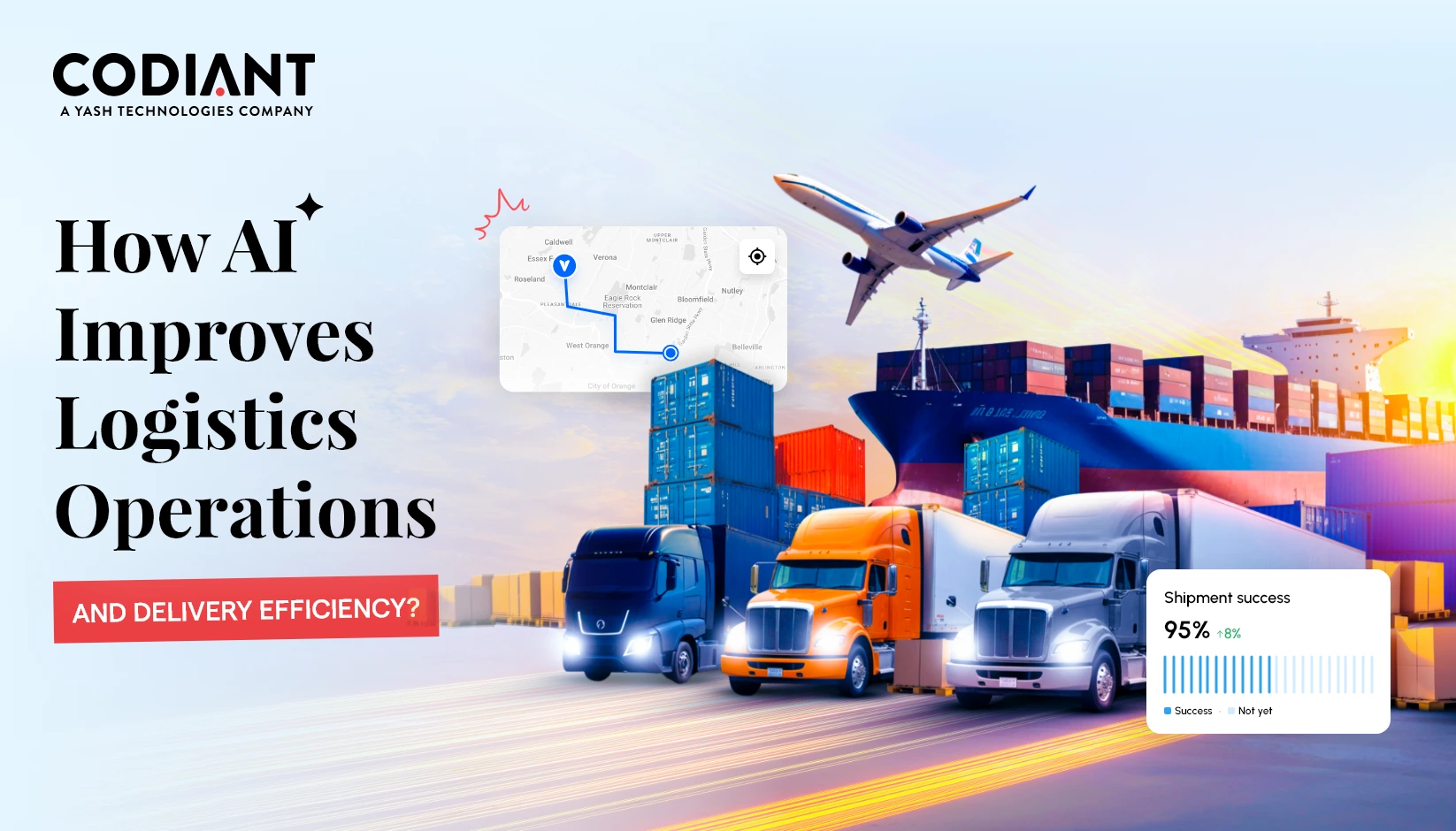
The logistics sector awaits disruption. The history of inefficiencies witnessed in the pandemic needs to be transported. Flexibility and productivity should be the heart of supply chain organizations.
Put it all together, as we write the new chapter of 2022, unlocking automation in the transport and logistics industry has become the only answer.
The logistics sector has always been a key player in connecting different national economies and cementing the way for the cyclic flow of goods exchanged globally. It is the nucleus of economic affluence and worldwide interconnection.
As the E-commerce volumes soar, automating freight flows, and digitalizing every touchpoint of the supply chain to efficiently handle a gamut of operations in a cost-effective and agile way should be the first agenda of logistics CEOs.
If reports are to be believed, by the year 2024, global freight volume will surge to 92.1 billion tons owing to external factors such as cost pressure, demand fluctuation, sustainability, complex and dynamic market, and changing consumer behavior by statista.
In such a fast-paced environment with growing transport volumes, Logistics management software solutions play a key interface for the managers in the supply chain. Giving them an efficient medium to monitor their shipments, optimize delivery routes, communicate with partners, and oversee distribution with full transparency.
With this article, Codiant- a leading logistics management software development company offers an overview of the market for transport management systems and talks on the upcoming technology trends that will reshape logistics management. Hope it helps you to gain new insights and inspires you to make technical advances.
Major Hurdles and Challenges In the Logistics Industry
Lack of Coordination
The major challenge the logistics industry goes through is inconsistency and fragmentation. In the logistics and trucking sector, multiple parties are involved —right from manufacturers and storekeepers to carriers, shippers, and end-users— which makes the coordination quite a tedious process. Certainly, monitoring each activity at every touchpoint without any central control is a time-consuming process that also misses the guarantee of accuracy. This open-ended fragmentation often causes inefficiency in establishing a synchronization among multiple parties.
Blunders In Warehouse Management
Warehouse management is another concern for the logistics industry to track and manage a huge number of goods and cargo. Feasibly it is quite complicated to manage a bulk of cargo. A single stock error results in misplaced or lost goods, thus, making product stacking in the warehouse a critical process than ever.
Given the chances of errors, companies prefer adopting warehouse management mobile applications powered with barcode scanners and voice technologies to automate the products’ stacking & loading process and identify goods digitally.
Absence of Internal Communication
Maintaining smooth internal communication and building organizational trust is the major challenge for any business to sustain in the competitive market. The culture of facilitating work processes directly bears on employee’s productivity level.
Apparently, companies lack the innovation to interact with employees or train them to adopt new tools or technologies to introduce changes in the work environment. This, as a result, decreases efficiency as well as divides the strategic vision organizations look to achieve.
To overcome this prevailing issue, companies must look for Top logistics app development that integrates management training functions.
Not Keeping Customers Well-Informed
Honest interactions with customers increase loyalty and build long-lasting relationships. This is where typically the logistics industry fails. Customers like to have flexibility—in placing orders online or offline, door-to-door package delivery or pick up from the store, tracking the shipment anytime—in addition to the urge to have a quicker and safer delivery.
Making all this possible and providing transparency to the customer at each step, while keeping them well informed remains a major challenge for the industry. Thanks to digital technologies, logistics apps powered with CRM solutions are acting as a forerunner to keep customers up-to-date about the delivery steps.
Fleet Inspection & Maintenance
To ensure smooth cargo shipment and eliminate downtime, companies require well-maintained vehicles. But to track the condition of all the vehicles on the daily basis is very complicated to do manually. Therefore, having a centralized system to inspect, take an update and status of each vehicle from any location will make it handy.
With Fleet management solutions, companies can adhere to routine vehicle check-ups, set service schedules, and receive automatic updates in real-time.
Influence of Technology In Logistic Software Development
Meeting Customer Expectations
As we inch closer towards digitalization, customers’ expectations are rising quickly. They expect quick and flexible delivery of goods with easy tracking. They seek order delivery flexibility by changing the shipment location just after the product left the warehouse.
Vehicle Maintenance
The inclusion of technology in trucking app development allows logistics companies to avail predictive maintenance tools to analyze vehicle conditions remotely. The sensor data and equipment monitoring tools help trucking management companies to track their fleet, regardless of fleet size and maintenance requirements.
Enhanced Security
The trucking and logistics software ensures improved data security and enables end-to-end monitoring of vulnerable cargo or components. Regular audits and testing enable to identify, rectification, and monitoring the possible threats in advance.
2022 Trends That Will Reshape Logistics Management
1. Growth of Equipment and Autonomous Vehicle
The demand for autonomous trucks and equipment is expected to increase and might result in wider adoption in 2022 and after that. Self-driving cars utilize AI systems for autonomous driving and in delivering packages which results in increased efficiency and reduction in cost.
Historically, driver-less vehicle and automated shipment management make things efficient by tracking the safety of goods; the speed of the delivery; in the digitalization of truck routes and capacity.
By leveraging these technology trends, the logistics sector can enhance its current business model and make it more mature and advanced.
2. Wide Adoption of Cloud Technology
Logistics is the most beneficial industry when it comes to cloud adoption. The use of predictive analytics is a key enabler to estimate and prevent bottlenecks in the supply chain. Obstacles accounting for last-mile deliveries which are often vulnerable to unpredictable disasters like bad weather, parking difficulties, traffic jams, and other challenges can be easily resolved through forecasting of events. Thus, impacting the customer experience positively and bringing down the additional costs.
Therefore, the accelerated adoption of the cloud across seamless information chains can make logistics operations more scalable, flexible, and reliable with improved security and reduced costs.
3. AI-Powered Fleet Management Apps
Artificial Intelligence works effectively in managing logistics and fleets by using data analytics. AI can improve your logistics processes by optimizing routes under any unforeseen circumstances or traffic patterns. Applying AI to the high volumes of data generated in the supply chain can help you analyze and identify trends and gain better insights to make improved decision-making. AI can further help in making the exact prediction of vehicle status which can eventually help fleet managers with fuel scheduling and maintenance.
4. Blockchain Integration
With more and more parties getting involved in supply chain management, Logistics is becoming increasingly complex. The complexities are arising in day-to-day logistics functions and creating challenges related to end-to-end visibility. This is where the Blockchain technology comes to the rescue. Blockchain apps within logistics functions make any irregularities that could interrupt a shipment clearly visible, enhance supply chain transparency and traceability, and ensure security by detecting fraud and preventing theft.
How Trucking App Development Can Improve Business Efficiency?
1. Implementation of Rules and Safety Measures
The fleet management company can monitor the condition of their trucks and keep track of whether they are following the traffic and safety rules or not through the advanced technology-supported tracking feature. The trucks should be well maintained, fuel-efficient, and follow all the standard safety norms of heavy vehicles. Following these traffic rules and regulations strictly will eliminate the chances of any fine or traffic misconduct, hence it improves the overall efficiency of the fleet.
2. Customer Satisfaction Improvement
Customers are the essence of any business – gaining happy customers is the sole aim of businesses. Satisfied customers tend to leave good reviews and these reviews are more likely to attract people’s attention and leads to generating more business traffic. The more the customer, the more your business will shoot up. The automated centralized logistics and trucking management system support the monitoring of the complete business activities for 24×7 from any location.
3. Fuel Efficiency
The smart trucking apps ease the monitoring and performance of logistics delivery. Meanwhile, to achieve consistency, the truck’s location, speed, and fuel consumption can also be taken care of through smart applications. Such monitoring features ensure that the driver is not burning too much fuel unnecessarily or purchasing excess fuel in an unauthorized manner. The monitoring of truck speed, location, track, and idle time will help to figure out the quantity of fuel consumption. This helps owners and drivers to look for some hacks to minimize such expenses or figure out the best route to achieve consistency.
4. Explore Competitors
To beat the competition, it is necessary to follow your competitors and study their marketing activities regularly. By applying this tactic, businesses can grab customers’ attention along with gaining efficiency in streamlining operations and improving staff efficiency. Thus, improving the logistics business performance will gradually improve customer relations and elevate efficient service delivery to a higher standard.
Related Reading: GPS-Tracking Platform for Business and Service Providers: Features, Benefits & Cost Covered
Summing Up
The vast potential of technology in logistics functions is identified as the key building block to achieving business efficiency. Reconstructing the strategy on the movement of goods through the above-discussed futuristic logistics business software can help you simplify the supply chain and achieve end-to-end transparency.





